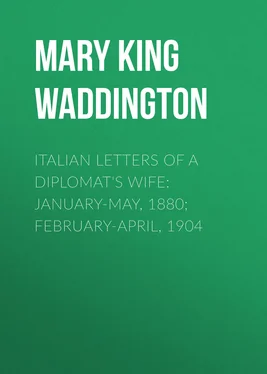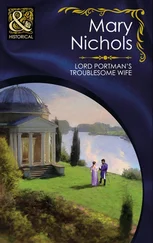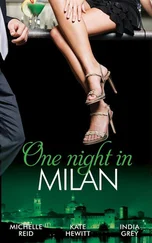Mary Waddington - Italian Letters of a Diplomat's Wife - January-May, 1880; February-April, 1904
Здесь есть возможность читать онлайн «Mary Waddington - Italian Letters of a Diplomat's Wife - January-May, 1880; February-April, 1904» — ознакомительный отрывок электронной книги совершенно бесплатно, а после прочтения отрывка купить полную версию. В некоторых случаях можно слушать аудио, скачать через торрент в формате fb2 и присутствует краткое содержание. Издательство: Иностранный паблик, Жанр: Биографии и Мемуары, История, foreign_edu, foreign_antique, foreign_prose, на английском языке. Описание произведения, (предисловие) а так же отзывы посетителей доступны на портале библиотеки ЛибКат.
- Название:Italian Letters of a Diplomat's Wife: January-May, 1880; February-April, 1904
- Автор:
- Издательство:Иностранный паблик
- Жанр:
- Год:неизвестен
- ISBN:нет данных
- Рейтинг книги:3 / 5. Голосов: 1
-
Избранное:Добавить в избранное
- Отзывы:
-
Ваша оценка:
- 60
- 1
- 2
- 3
- 4
- 5
Italian Letters of a Diplomat's Wife: January-May, 1880; February-April, 1904: краткое содержание, описание и аннотация
Предлагаем к чтению аннотацию, описание, краткое содержание или предисловие (зависит от того, что написал сам автор книги «Italian Letters of a Diplomat's Wife: January-May, 1880; February-April, 1904»). Если вы не нашли необходимую информацию о книге — напишите в комментариях, мы постараемся отыскать её.
Italian Letters of a Diplomat's Wife: January-May, 1880; February-April, 1904 — читать онлайн ознакомительный отрывок
Ниже представлен текст книги, разбитый по страницам. Система сохранения места последней прочитанной страницы, позволяет с удобством читать онлайн бесплатно книгу «Italian Letters of a Diplomat's Wife: January-May, 1880; February-April, 1904», без необходимости каждый раз заново искать на чём Вы остановились. Поставьте закладку, и сможете в любой момент перейти на страницу, на которой закончили чтение.
Интервал:
Закладка:
Some of the women were quite absorbed, looking hard at the Madonna in her shrine as if they expected some visible sign of pity, or promise of help. I rather envied them their simple faith; it must help them through many moments of trial and discouragement.
As usual I seem to have wandered from my original subject, but Italy is so full of memories. We were too tired to walk home, besides were a little late, so we took a fiacre with a most friendly coachman, who saw at once that we were strangers, pointed out all the places of interest, and said it would be a delightful afternoon for Fiesole, and he would come and get us if we would name the hour.
We found lots of letters and papers at the house, and W. plunged into Paris and politics after breakfast. I went for a drive with Mary and Beatrice to the Villa Careggi. The house is nothing remarkable—a large square building with enormous rooms, deep fireplaces, and very high ceilings. Some good frescoes on the walls. The garden and terraces were enchanting—the sun really too warm on the terrace—always a divine view; blue-purple hills rolling away in the distance, and funny, crooked little roads shut in between high walls, with every now and then a gap, or a gate, which gave one glimpses of straggling, unkempt gardens, with a wealth of flowers and vines.
We had a quiet dinner and evening, which we all enjoyed. W. smoked and talked a great deal of the past year and the last days at the Quai d'Orsay. He doesn't miss the life in the least, which rather surprises me; I thought he would be so bored with suddenly nothing to do, and no part to play in the world's history; but I see that the absolute rest and being with all his family is doing him so much good. It is extraordinary how soon one forgets, and takes up a quiet life again. Already the whirl and fatigues of the Exhibition year seem so far away I feel as if somebody else had lived that life. I cannot imagine myself now dining out (and not ordinary dinners, official banquets) 19 nights in succession, but I suppose I should begin again quite naturally if we returned to public life.
Did you see the article in the "Français" saying "M. Waddington will now have all the rest of his life before him to consecrate to his studies"? I wonder! This morning we had our usual walk—as W. was ready at ten o'clock I didn't make my regular station in the Boboli Gardens. We went to Vieusseux about a book W. wanted, and then into the bank to pay George Maquay a visit. He was most cheerful, and showed us a nice article in the "Times" regretting very much W.'s departure from the Foreign Office, "one of the few men who could look ahead a little, and who was independent, not limited in his views by what the Chamber of Deputies would think." I was rather pleased, but W. is very calm about all newspaper articles. He always has a "mauvaise presse" as we don't soigner any paper. I fancy, though, Henrietta is right when she says the next time he takes office she means to buy one—so many people believe implicitly all they see in a paper, especially when it says what you want to believe.
We did a little shopping, I wanted some veils, and W. remained outside looking at the grim old Strozzi Palace, standing like a great fortress with its huge stones and heavy doors in the middle of all the busy, bustling life of the Tornabuoni. I think it is the one street in Florence where people move about quickly, and as if they were going somewhere. Everywhere else there are crowds of people, men especially, doing nothing but sitting all day in the sun looking at the passers-by.
We hadn't time to walk over to San Lorenzo, so hailed a fiacre, and wandered about there for some time. I was delighted to see the Medici Chapel again and the famous monument of Lorenzo. He does look as if he were thinking out some great problem—I wonder what he would think of our go-ahead, unartistic world, and of our politicians, so timorous and afraid of responsibility—at least the men of that race were strong for good or for evil. When they wanted anything they did all they could to get it. I don't know that the women were behindhand either in energy when one thinks of Queen Catherine and of all the Huguenots she disposed of one summer evening in Paris. Do you remember our friend Mrs. A., a converted Catholic, whom we overheard one night at the Opera when they were shooting all the Huguenots in the last act, telling her daughter (remained a Protestant) that the Saint Bartholomew had nothing to do with Catholics and Protestants; was entirely a political move.
We have had a long drive this afternoon with Mary and Charles, up the Poggio Imperiale—a stiff climb but such a beautiful road—villas, cypresses, olive trees, and roses everywhere. We went up to the Certosa, where a nice old monk, in his white dress, showed us the church and monastery. It was dark and rather cold in the church, and nothing particular to see—good frescoes and many coloured marbles—but the terrace outside was delightful. There were not too many beggars on the road considering that it is the favourite drive in Florence, and of course the carriage people are at a disadvantage as they must go slowly up the hill, and are escorted by a long troop of children singing, dancing with a sort of tambourine, turning somersaults, and enjoying life generally, whether they get a few pennies or not. It is very difficult to resist the children with their smiling faces and evident desire to amuse the "forestieri."
We went to Casa Guadagni before we came home, and paid a visit to the Marchesa, who was at home. The same old porter was at the door, and greeted me most warmly, much pleased to see W. "bel uomo, il marito"—had I any children, and where were all the rest of the family?—that simple, natural Italian manner, without a thought of familiarity. W. was delighted with Madame Guadagni. She talked about everything and really didn't look any older. I asked about our old apartment (piano nobile—first floor); she said it was always let—generally to foreigners. I didn't ask if she had made any modern improvements since we lived there. Shall you ever forget that cold winter with the doors that wouldn't open, and the windows that wouldn't shut, and the chimneys that always smoked, and the calorifère, which John never would light, as he was afraid it would warm the Guadagni rooms below? I should have liked to go over the apartment and see the rooms again—the big ball-room where we danced so often and had so much music. We wound up with a turn in the Cascine, drawing up in the Piazza alongside of Lottie's carriage, which was of course surrounded by all the gilded youth of Florence. Maquay came to talk to us, Carlo Alessandri and Serristori, whom I hadn't yet seen. He was just the same (laughing and criticising) as in the old days when some of the swells appeared in so-called Worth garments, which he said were all made in a little room over his stables, by the wife and daughters of one of his men.
I was glad to get in and have a quiet hour to write before dinner. I am at my table close up to the open window. The air is soft and delicious—the garden just beginning to look dark and mysterious in the waning light. The group of cypresses (I don't know how to write that in the plural, it looks funny) always black. I was called off various times, and must finish now as we are going to dine at the Maquays—we being ourselves, Mary, and Charles. We generally go about a family party.
Sunday, February 21, 1880.We are making our pacquets as we have decided to leave for Rome on Monday (22). The Schuylers are clamouring for us, and though I hate to leave here I really think we ought to go. As W. has never seen Rome two months will not be too much. We shan't have much more as he wants to get home for the Conseil Général. The Schuylers want to have a big reception for us, and would like next Sunday week, so I think we really shall get off this time. The longer we stay the more invitations we have. It has been all quite charming. Our Maquay dinner was very easy and pleasant; the Tchiatcheffs, Lottie, Alessandri, Talleyrands, Mrs. Fuller, and one or two stray men. The house looked so natural—of course the ball-room wasn't open as we were a small party, but they lighted it after dinner. I wanted W. to see how pretty it was and how light—white with red seats all around. How it took me back to old times? I seemed to see everybody settling for the cotillon—the stairs too, where we all used to sit waiting for the cotillon to begin. How we amused ourselves that winter in Florence, and how scattered all that little band is now. The Florentines amuse themselves still—there must be something in the air which makes people light-hearted—one can't imagine a serious, studious life in Florence.
Читать дальшеИнтервал:
Закладка:
Похожие книги на «Italian Letters of a Diplomat's Wife: January-May, 1880; February-April, 1904»
Представляем Вашему вниманию похожие книги на «Italian Letters of a Diplomat's Wife: January-May, 1880; February-April, 1904» списком для выбора. Мы отобрали схожую по названию и смыслу литературу в надежде предоставить читателям больше вариантов отыскать новые, интересные, ещё непрочитанные произведения.
Обсуждение, отзывы о книге «Italian Letters of a Diplomat's Wife: January-May, 1880; February-April, 1904» и просто собственные мнения читателей. Оставьте ваши комментарии, напишите, что Вы думаете о произведении, его смысле или главных героях. Укажите что конкретно понравилось, а что нет, и почему Вы так считаете.












